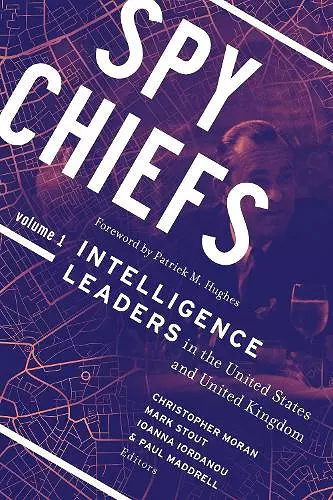Spy Chiefs: Volume 1
Intelligence Leaders in the United States and United Kingdom
Mark Stout editor Ioanna Iordanou editor Paul Maddrell editor Christopher Moran editor
Format:Hardback
Publisher:Georgetown University Press
Published:1st Feb '18
Currently unavailable, our supplier has not provided us a restock date
This hardback is available in another edition too:
- Paperback£24.00(9781626165199)

Addressing questions about the nature, effectiveness and limits of intelligence leadership in the US and UK, this pathbreaking volume illuminates a key dimension of the knowledge-secrecy-power nexus that helps define intelligence. Original and highly informative, it provides an anatomy of intelligence leadership that will be an indispensable source for students and also points towards future research possibilities. -- Mark Phythian, University of Leicester The contributors to this unique volume cut through the mystique and secrecy surrounding many of the men and women who once stood at the apex of British and American intelligence. Their fascinating accounts illustrate the quirks, brilliance, and failures of the leaders who not only shaped organizational cultures, but also the role of intelligence in national policy. -- James J. Wirtz, Naval Postgraduate School, Monterey, California
In literature and film the spy chief is an all-knowing, all-powerful figure who masterfully moves spies into action like pieces on a chessboard. How close to reality is that depiction, and what does it really take to be an effective leader in the world of intelligence? This first volume of Spy Chiefs broadens and deepens our understanding of the role of intelligence leaders in foreign affairs and national security in the United States and United Kingdom from the early 1940s to the present. The figures profiled range from famous spy chiefs such as William Donovan, Richard Helms, and Stewart Menzies to little-known figures such as John Grombach, who ran an intelligence organization so secret that not even President Truman knew of it. The volume tries to answer six questions arising from the spy-chief profiles: how do intelligence leaders operate in different national, institutional, and historical contexts? What role have they played in the conduct of international relations and the making of national security policy? How much power do they possess? What qualities make an effective intelligence leader? How secretive and accountable to the public have they been? Finally, does popular culture (including the media) distort or improve our understanding of them? Many of those profiled in the book served at times of turbulent change, were faced with foreign penetrations of their intelligence service, and wrestled with matters of transparency, accountability to democratically elected overseers, and adherence to the rule of law. This book will appeal to both intelligence specialists and general readers with an interest in the intelligence history of the United States and United Kingdom.
Spy Chiefs feels like a deep reference book, yet reads like a detailed, intelligent, lengthy work of fiction.
* John Koenig Stuff I Like *Will appeal to both intelligence specialists and general readers.
* Eye Spy International *Broadens and deepens our understanding of the role of intelligence leaders in foreign affairs and national security.
* Intelligencer *The two volumes are superbly researched and fill a scholarly gap.
-- Colonel Peter L. Larsen * Journal of Foreign AffaiISBN: 9781626165182
Dimensions: unknown
Weight: 635g
352 pages